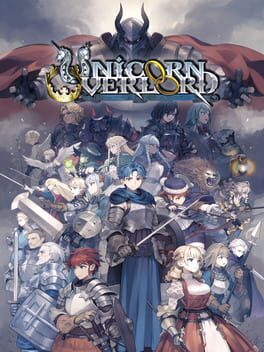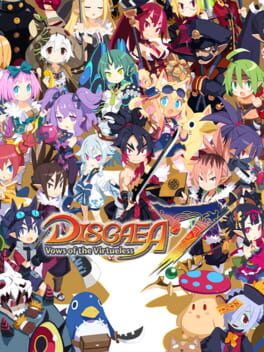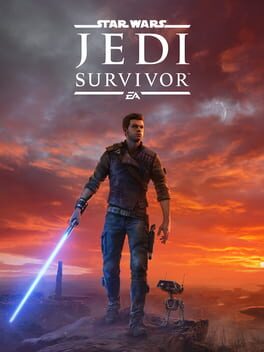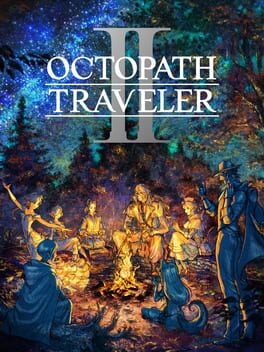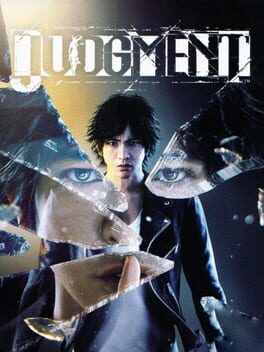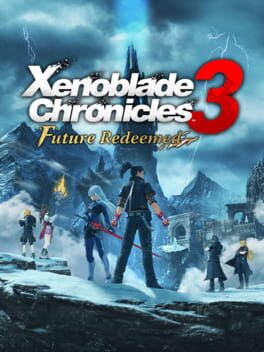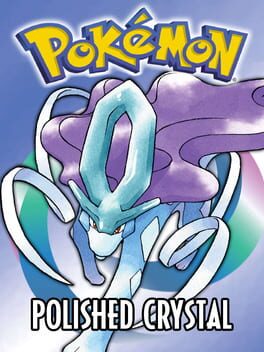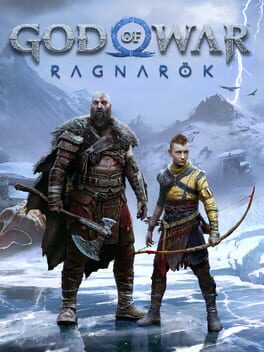aipom
2024
At its core, Unicorn Overlord features deep real-time strategy and tactical decision making that stays fresh for most of the game. Beautiful backdrops, music, and enough systems to keep managing your army interesting. Equipment not only affects your stats, but the abilities a character can use, a la Final Fantasy tactics. There are two currencies: Honor-- which you can spend on unit growth, and gold for buying items. Your army's Renown increases as you make a name for yourself by winning battles and restoring towns to their antebellum state, which in turn increases the maximum size of your units and applies a multiplier to the amount of honor and renown you earn. It's a satisfying loop.
Unicorn Overlord's call to fame is its tactics menu, which allows the player to set conditional statements for when each character's abilities trigger. This was a source of hours of fun for me. I would often stare at the tactics menu for a character for 20 minutes before getting on with the game. Once you land on a set of tactics that works, especially in the last quarter of the game when your characters have learned all of their abilities, then things can start feeling repetitive. Since the game shows you the outcome of each skirmish before the animation plays out (which I like), I found myself skipping the gorgeous visuals to get on with the larger fight.
Some of the other systems the game introduces felt clunky or misplaced. I didn't engage with the gift system at all, which did not impede my ability to gain rapport with my army. Stationing a guard at each liberated town nets you resources after each battle, which adds to the fun of the gameplay loop. But in order to station a guard at every town, you'd have to hire about 60 generic merceneries (as opposed to the "unique" main characters of the story). There is little reason to recruit them otherwise, as you certainly can't use that many characters in combat. And they just clog the same menu used to form units for battle.
Speaking of menus, I was constantly appreciative of how snappy, fluid, and beautiful the UI was in Unicorn Overlord. You're able to get a lot done with just a few button taps and in only a few seconds. That said, the equipment menu was a huge source of frustration. You cannot sort gear alphabetically. The most useful ways of sorting are usually by Order Acquired and by Not Eqipped. But as my inventory grew, I really wished I could sort alphabetically to find specific items-- especially since swapping equipment is such a key part of how battles play out.
I didn't find the story particularly interesting and I found the character designs somewhat lacking. The overworld sprites in particular were kind of odd and souless (and had different hair color than the character they were meant to represent?? Was that just me?).
I had fun with it despite these frustrations. I would recommend Octopath Traveler 2 or Triangle Strategy if the tactics system isn't for you but you still want the whole "build an army" thing. 13 Sentinels is still Vanillaware's best game.
Unicorn Overlord's call to fame is its tactics menu, which allows the player to set conditional statements for when each character's abilities trigger. This was a source of hours of fun for me. I would often stare at the tactics menu for a character for 20 minutes before getting on with the game. Once you land on a set of tactics that works, especially in the last quarter of the game when your characters have learned all of their abilities, then things can start feeling repetitive. Since the game shows you the outcome of each skirmish before the animation plays out (which I like), I found myself skipping the gorgeous visuals to get on with the larger fight.
Some of the other systems the game introduces felt clunky or misplaced. I didn't engage with the gift system at all, which did not impede my ability to gain rapport with my army. Stationing a guard at each liberated town nets you resources after each battle, which adds to the fun of the gameplay loop. But in order to station a guard at every town, you'd have to hire about 60 generic merceneries (as opposed to the "unique" main characters of the story). There is little reason to recruit them otherwise, as you certainly can't use that many characters in combat. And they just clog the same menu used to form units for battle.
Speaking of menus, I was constantly appreciative of how snappy, fluid, and beautiful the UI was in Unicorn Overlord. You're able to get a lot done with just a few button taps and in only a few seconds. That said, the equipment menu was a huge source of frustration. You cannot sort gear alphabetically. The most useful ways of sorting are usually by Order Acquired and by Not Eqipped. But as my inventory grew, I really wished I could sort alphabetically to find specific items-- especially since swapping equipment is such a key part of how battles play out.
I didn't find the story particularly interesting and I found the character designs somewhat lacking. The overworld sprites in particular were kind of odd and souless (and had different hair color than the character they were meant to represent?? Was that just me?).
I had fun with it despite these frustrations. I would recommend Octopath Traveler 2 or Triangle Strategy if the tactics system isn't for you but you still want the whole "build an army" thing. 13 Sentinels is still Vanillaware's best game.
2024
Features some bold narrative choices that will stick with me for a long time. I hadn't played any other iteration of Persona 3 before this, and managed to avoid spoilers for over a decade. I'm grateful for that.
The voice acting performances were killer. I really enjoyed how each party member had their version of a social link (Life link) that led to a unique passive ability in combat. These were usually extremely strong and fun to take advantage of. They also clue you in to the character's optimal role in combat.
I have a list of minor complaints that frustrated me at least once:
1. The Full Moon battles should have involved a dungeon. Those encounters felt like they could have been fleshed out more.
2. I can't stand when there's an invisible damage cap on an enemy's health bar that triggers the next phase of a fight. When I spend time fusing strong Personas or optimizing my party, I appreciate the chance to steamroll bosses.
3. Some of the social links were flat-out boring. A lot of repetitive dialogue and lifeless gestures. Some of the social links should only have 5 ranks because those people just aren't interesting enough to warrant 10 cutscenes.
Again, the narrative of this game (the third act especially) is something I'll think about a lot. The finale took me by complete surprise and it was executed gently and perfectly.
The voice acting performances were killer. I really enjoyed how each party member had their version of a social link (Life link) that led to a unique passive ability in combat. These were usually extremely strong and fun to take advantage of. They also clue you in to the character's optimal role in combat.
I have a list of minor complaints that frustrated me at least once:
1. The Full Moon battles should have involved a dungeon. Those encounters felt like they could have been fleshed out more.
2. I can't stand when there's an invisible damage cap on an enemy's health bar that triggers the next phase of a fight. When I spend time fusing strong Personas or optimizing my party, I appreciate the chance to steamroll bosses.
3. Some of the social links were flat-out boring. A lot of repetitive dialogue and lifeless gestures. Some of the social links should only have 5 ranks because those people just aren't interesting enough to warrant 10 cutscenes.
Again, the narrative of this game (the third act especially) is something I'll think about a lot. The finale took me by complete surprise and it was executed gently and perfectly.
I don’t know where to fit this into the rest of the review, so let me just get this out of the way first: Yamai put this game on his back. One of the best new characters in gaming this decade. This guy is a REAL yearner. He loves dusty old women and wants you to know it.
Infinite Wealth is a prime example of how to use a sequel to make thoughtful improvements to a solid formula. The turn based combat has been retooled to give the player more control over unit positioning and areas of effect. The new job progression means less fussing over stat growth and encourages experimentation. The expanded social link system gives party members ample opportunity to display on-screen chemistry outside of the main story— enabling the player to buy into the game’s characterization of its protagonist as a man with an uncanny ability to unite people.
Speaking of Ichiban Kasuga, I don't think there's any doubt that he takes a backseat to Kiryu in this game. Despite Ichi being the new face of the series and having the torch passed to him in Yakuza 7, Infinite Wealth funnels all of its juicy character development and opportunities for true drama to the ol’ Dragon of Dojima. Who am I to complain, though? I loved every second of it. But it struck me as odd that Ichiban didn't get the same treatment. He has one opportunity to demonstrate true personal growth, and it’s played as a gag that sets him back to square one. He is made out to be a caricature— a cartoonish, idealistic hero. Meanwhile, Kiryu is portrayed more like a real human than ever before-- flaws and all.
With all of the thematic emphasis on closure and solidifying legacies, I’m surprised by how many loose ends Infinite Wealth leaves us with. In some ways, this makes the game feel like the second installment of a trilogy, which is fine. But in other cases, there were plot details simply left out or things that I would have liked to see fleshed out that probably never will be.
My final complaint is minor. There is a trophy for reaching level 70. After finishing all of the content in the game, my party was in the low 50s with few options for grinding. Outside of the achievement list, there is no reason to push the party past level 60. The hardest bosses in the game can be beaten far below that. The game’s most natural path to level 70 is locked behind paid DLC, which grants access to high level end-game dungeons.
I’m ultimately giving this game a slightly lower score than Gaiden. Gaiden didn’t have much to engage with outside of its extremely tight, well-told main story. Infinite Wealth, on the other hand, has engrossing side content that could warrant its own games. I was constantly entertained by a variety of activities. However, the weirdly paced story— despite many highlights— and mishandling of certain characters left me scratching my head at times. To me, no Yakuza game has managed to create the perfect blend of narrative and gameplay quite like Yakuza 0. But these two most recent entries have been thoroughly enjoyable nonetheless.
Infinite Wealth is a prime example of how to use a sequel to make thoughtful improvements to a solid formula. The turn based combat has been retooled to give the player more control over unit positioning and areas of effect. The new job progression means less fussing over stat growth and encourages experimentation. The expanded social link system gives party members ample opportunity to display on-screen chemistry outside of the main story— enabling the player to buy into the game’s characterization of its protagonist as a man with an uncanny ability to unite people.
Speaking of Ichiban Kasuga, I don't think there's any doubt that he takes a backseat to Kiryu in this game. Despite Ichi being the new face of the series and having the torch passed to him in Yakuza 7, Infinite Wealth funnels all of its juicy character development and opportunities for true drama to the ol’ Dragon of Dojima. Who am I to complain, though? I loved every second of it. But it struck me as odd that Ichiban didn't get the same treatment. He has one opportunity to demonstrate true personal growth, and it’s played as a gag that sets him back to square one. He is made out to be a caricature— a cartoonish, idealistic hero. Meanwhile, Kiryu is portrayed more like a real human than ever before-- flaws and all.
With all of the thematic emphasis on closure and solidifying legacies, I’m surprised by how many loose ends Infinite Wealth leaves us with. In some ways, this makes the game feel like the second installment of a trilogy, which is fine. But in other cases, there were plot details simply left out or things that I would have liked to see fleshed out that probably never will be.
My final complaint is minor. There is a trophy for reaching level 70. After finishing all of the content in the game, my party was in the low 50s with few options for grinding. Outside of the achievement list, there is no reason to push the party past level 60. The hardest bosses in the game can be beaten far below that. The game’s most natural path to level 70 is locked behind paid DLC, which grants access to high level end-game dungeons.
I’m ultimately giving this game a slightly lower score than Gaiden. Gaiden didn’t have much to engage with outside of its extremely tight, well-told main story. Infinite Wealth, on the other hand, has engrossing side content that could warrant its own games. I was constantly entertained by a variety of activities. However, the weirdly paced story— despite many highlights— and mishandling of certain characters left me scratching my head at times. To me, no Yakuza game has managed to create the perfect blend of narrative and gameplay quite like Yakuza 0. But these two most recent entries have been thoroughly enjoyable nonetheless.
There's not a ton here in terms of story or side content compared to the other games. Most of the really good story stuff is packed into the final chapter, where we're given some extremely emotional moments with Kiryu and fun cameos. But thanks to the narrative being so tight, it doesn’t take long to get there. The final act features what I think is one of the best scenes in the series.
I was so sure that I was going to fixate on Yakuza fighting style for the whole game, but as I started upgrading the Agent style, I switched over and never looked back. Combat felt really fluid, especially with the Serpent boots.
Because the game has less than half the number of chapters compared to a usual Yakuza game, I felt like I could engage with the side activities without pouring 100+ hours into the game. This eventually led me to get the platinum trophy without much effort.
I can't wait for Infinite Wealth!
I was so sure that I was going to fixate on Yakuza fighting style for the whole game, but as I started upgrading the Agent style, I switched over and never looked back. Combat felt really fluid, especially with the Serpent boots.
Because the game has less than half the number of chapters compared to a usual Yakuza game, I felt like I could engage with the side activities without pouring 100+ hours into the game. This eventually led me to get the platinum trophy without much effort.
I can't wait for Infinite Wealth!
This was perfect gaming experience for me, especially when the levels started getting more challenging. There’s something to be said about how there are over 150 levels in Mario Wonder and not a single one frustrated me. New concepts were baked into the design of each course. They were all brimming with creativity.
Very minor things- I would have appreciated it if power ups were sold in the shops. I found myself hoarding flower coins with nothing to spend them on. The game is short, but there’s tons of replaybility if you’re going for full completion.
Very minor things- I would have appreciated it if power ups were sold in the shops. I found myself hoarding flower coins with nothing to spend them on. The game is short, but there’s tons of replaybility if you’re going for full completion.
This is probably the best Disgaea game in the series from a QoL and mechanics standpoint. Maybe the best full-stop, depending on how you feel about the story. The thing is, I don’t think this franchise works for me anymore. I’m a longtime fan of the series. I used to gobble this stuff up. I would spend hours engaging with the different menus, doing anything but advancing the story. Maybe its because I’m getting older, but it just didn’t hook me this time around. Fully realizing that excessiveness is something Disgaea has always embraced, it finally started to feel cumbersome for me as I found myself managing over 20 units and their equipment, abilities, and skill levels. On top of that, your equipment has equipment. And your skills have ranks that you can choose to improve. It’s a lot. Too much for me at this stage in my gaming career.
So in order to enjoy Disgaea 7 enough to get to the finish line, I ignored a few of its features. I still spent some time in the Item World, leveling up my equipment and even re-did a few stages to grind levels. But really just the bare minimum required to breeze through the main story.
A highlight for me was the unique checklist of objectives the game gives you for each map (limits on the number/type of deployed units, for example). This made each map far more interesting than if I just used brute force and the maximum number of units. It was very satisfying to start each stage by comparing the map layout to the list of objectives. It’s very easy to restart the stage if you mess up, but the “undo button” is also very forgiving. You can get away with a lot before you’re forced to restart a stage entirely.
The writing in this game also made me dread picking up the controller sometimes. Again, it’s the same sense of humor this series has always had, but I think I’ve outgrown it. Every so often a joke would land, but it was more common for every sentence to feel like a vehicle for a childish gag. Often the same joke repeated numerous times. Just an absolutely ridiculous script and plot. The English voice actors did an excellent job with it though. I liked Pirilika in particular. Both her characterization and the performance by her voice actor.
If I were awarding stars based on how good of a Disgaea game this is, it'd be an easy five. But for me, I couldn't wait to be done.
So in order to enjoy Disgaea 7 enough to get to the finish line, I ignored a few of its features. I still spent some time in the Item World, leveling up my equipment and even re-did a few stages to grind levels. But really just the bare minimum required to breeze through the main story.
A highlight for me was the unique checklist of objectives the game gives you for each map (limits on the number/type of deployed units, for example). This made each map far more interesting than if I just used brute force and the maximum number of units. It was very satisfying to start each stage by comparing the map layout to the list of objectives. It’s very easy to restart the stage if you mess up, but the “undo button” is also very forgiving. You can get away with a lot before you’re forced to restart a stage entirely.
The writing in this game also made me dread picking up the controller sometimes. Again, it’s the same sense of humor this series has always had, but I think I’ve outgrown it. Every so often a joke would land, but it was more common for every sentence to feel like a vehicle for a childish gag. Often the same joke repeated numerous times. Just an absolutely ridiculous script and plot. The English voice actors did an excellent job with it though. I liked Pirilika in particular. Both her characterization and the performance by her voice actor.
If I were awarding stars based on how good of a Disgaea game this is, it'd be an easy five. But for me, I couldn't wait to be done.
I'm glad I got this game during a sale after a lot of the bugs had been patched out. The game ran somewhat well. It absolutely couldn't handle one particularly busy scene and crashed once. Smooth experience otherwise.
On to the gameplay. It obviously didn't feel as novel as the first time I played Fallen Order. I was less inclined to spend time exploring each stance and perk combinations and instead latched onto the same playstyle for the whole game. I never got to the point where I had fully internalized all of the tools at my disposal in combat. Different button combinations result in various force powers and lightsaber maneuvers, but to me it felt just a little bit unrefined. The mind trick force power would only work on certain enemies in certain environments and I don't recall the game explaining why.
Outside of combat, the exploration and ancillary parts of the world were a flat-out mess. This was possibly one of the worst maps a video game has ever given me. I made the decision early into the game to ignore side quests because the map wasn't a reliable enough tool to get me where I needed to go. It's bizzare to me that this game has a gardening minigame and a fish tank minigame, devoid of any incentive to engage with them. In fact, I hardly wanted to seek out the NPCs responsible for distributing aesthetics and combat perks. I would have appreciated if those cosmetics and upgrades were baked into the pause menu or save points instead of in ONE building on ONE planet. In an effort to fill the game's open world with things to do, they made it feel cluttered and tedious. I would have appreciaited a "less is more" approach.
In addition to the awful map, the menus in this game were atrocious. The workbench menus were especially unintuitive. I did not like how you could see three lightsaber components on screen at a time when choosing the one you want to equip.
AAA adventure games have a tendency to feel like a climbing simulator after a while, but Jedi Survivor has a much faster climbing animation than, say, God of War: Ragnarok. The swift parkour you're able to do via force jumping and dashing alleviated this too. This was one of the games strengths.
The other strong point was the story. I dislike when narrative is one of a game's only strengths, because it makes me wonder why I'm playing a game instead of watching a show or film. This being a Star Wars story amplified this feeling.
I do not think this game improves on its predecessor, which, I think, should be a primary goal of any sequel.
On to the gameplay. It obviously didn't feel as novel as the first time I played Fallen Order. I was less inclined to spend time exploring each stance and perk combinations and instead latched onto the same playstyle for the whole game. I never got to the point where I had fully internalized all of the tools at my disposal in combat. Different button combinations result in various force powers and lightsaber maneuvers, but to me it felt just a little bit unrefined. The mind trick force power would only work on certain enemies in certain environments and I don't recall the game explaining why.
Outside of combat, the exploration and ancillary parts of the world were a flat-out mess. This was possibly one of the worst maps a video game has ever given me. I made the decision early into the game to ignore side quests because the map wasn't a reliable enough tool to get me where I needed to go. It's bizzare to me that this game has a gardening minigame and a fish tank minigame, devoid of any incentive to engage with them. In fact, I hardly wanted to seek out the NPCs responsible for distributing aesthetics and combat perks. I would have appreciated if those cosmetics and upgrades were baked into the pause menu or save points instead of in ONE building on ONE planet. In an effort to fill the game's open world with things to do, they made it feel cluttered and tedious. I would have appreciaited a "less is more" approach.
In addition to the awful map, the menus in this game were atrocious. The workbench menus were especially unintuitive. I did not like how you could see three lightsaber components on screen at a time when choosing the one you want to equip.
AAA adventure games have a tendency to feel like a climbing simulator after a while, but Jedi Survivor has a much faster climbing animation than, say, God of War: Ragnarok. The swift parkour you're able to do via force jumping and dashing alleviated this too. This was one of the games strengths.
The other strong point was the story. I dislike when narrative is one of a game's only strengths, because it makes me wonder why I'm playing a game instead of watching a show or film. This being a Star Wars story amplified this feeling.
I do not think this game improves on its predecessor, which, I think, should be a primary goal of any sequel.
2019
2023
This plays a lot like the Bravely Default series with about 10x the amount of style and polish. That is to say I loved the job system and rewarding exploration.
I think the game falls short structurally. To be fair, something like this seems pretty difficult to pull off. The introductory chapters felt like a slog. And then I just felt like I was going down a laundry list of isolated (somewhat predictable) story beats when I really just wanted the party to experience and react to things together. The travel banter was a nice addition, but it usually didn't amount to much more than the characters telling eachother "I'm here for you! I support you!" over and over. I wish I could say this was a minor complaint, but it did make me consider skipping a bunch of cutscenes here and there.
That said, the story ends on a really cool note with a concentrated dose of the comeraderie I was looking for in the earlier parts of the game. By the endgame, I was having a blast experimenting with different party builds, finding powerful treasure in optional areas, and just generally enjoying the impressive depth of this massive world Octopath Traveler II puts you in. I would love to play a third installment of this series, but I'm also glad I didn't bother playing the first.
I think the game falls short structurally. To be fair, something like this seems pretty difficult to pull off. The introductory chapters felt like a slog. And then I just felt like I was going down a laundry list of isolated (somewhat predictable) story beats when I really just wanted the party to experience and react to things together. The travel banter was a nice addition, but it usually didn't amount to much more than the characters telling eachother "I'm here for you! I support you!" over and over. I wish I could say this was a minor complaint, but it did make me consider skipping a bunch of cutscenes here and there.
That said, the story ends on a really cool note with a concentrated dose of the comeraderie I was looking for in the earlier parts of the game. By the endgame, I was having a blast experimenting with different party builds, finding powerful treasure in optional areas, and just generally enjoying the impressive depth of this massive world Octopath Traveler II puts you in. I would love to play a third installment of this series, but I'm also glad I didn't bother playing the first.
2018
The story was better than a lot of the Yakuza series, but mechnically it barely felt like I was playing a video game. The tailing missions were bad. Combat and character upgrades didn't feel as satisfying as Yakuza. I really think Judgment would have made a better law drama TV show than a video game.
As a sandbox, this game is a masterpiece. But I feel like I have to dock it because every time I completed a temple, my reaction was "now I can get back to having FUN". Also, it's just baffling how much of the story the game allows you to learn incidentally or through side quests. And then you have to sit through these main story sequences where the entire goal is to figure out things you already know.
This game presents a version of Johto that, in my opinion, is better than GSC and HGSS. The level curve is much improved, the spritework is beautiful, and the roster of Pokemon is vast without feeling too contrived. It really feels like an enhanced version of the original game and not your typical unrestrained fan game.
For the last few generations, I've grown used to steamrolling through battles with Pokemon that were either overleveled or able to take advantage of poor AI decision-making. Polished Crystal really highlights how much has been stripped away from the battling part of the game to cater to a younger audience. Held items that are mostly reserved for post-game/competitive play (Focus Sash, Choice Band, etc.) are handed to you early on in Polished Crystal and are instrumental in pushing through the gym league. It was a blast applying strategies from the competitive Pokemon world to in-game trainer battles and STILL having to think about each move.
The most fun I've had with a Pokemon game in years.
For the last few generations, I've grown used to steamrolling through battles with Pokemon that were either overleveled or able to take advantage of poor AI decision-making. Polished Crystal really highlights how much has been stripped away from the battling part of the game to cater to a younger audience. Held items that are mostly reserved for post-game/competitive play (Focus Sash, Choice Band, etc.) are handed to you early on in Polished Crystal and are instrumental in pushing through the gym league. It was a blast applying strategies from the competitive Pokemon world to in-game trainer battles and STILL having to think about each move.
The most fun I've had with a Pokemon game in years.
This was a really unique experience. I think there were some gameplay hiccups like having to physically return to each corpse to replay memories, which I know is a common complaint. But even that helped crystalize the layout of the ship in my head and commit it memory. I was expecting maybe a little more of a shock or twist but I'm satisfied with my time spent playing.
2022
Beautiful game with extraordinary performances from the entire cast. Impressive enemy variety. The combat felt a little stale after a while. The menus were ugly and a pain to navigate. The way the camera behaves makes it seem like the game wasn't designed to have you fight multiple enemies at once, and yet there are many such encounters.
